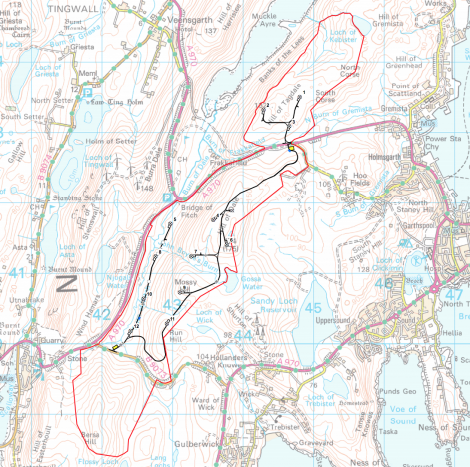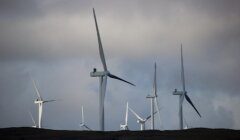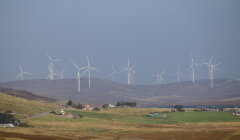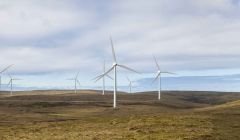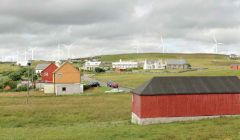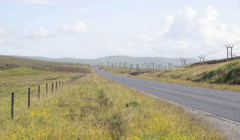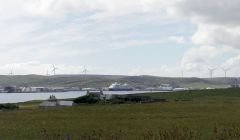Energy / Councillors recommended to approve Mossy Hill wind farm plans
COUNCILLORS are being recommended to approve plans for the proposed 12-turbine Mossy Hill wind farm on the outskirts of Lerwick as its “impacts would be outweighed by the benefits of renewable energy generation”.
That is the message from Shetland Islands Council planning officers to members of the local authority’s planning committee before they make a decision on the development at a meeting on Monday.
Councillors on the committee have been told that the proposed Peel Energy development would make a “significant contribution to meeting greenhouse gas emission and renewable energy targets” and would provide job opportunities and contribute to the local economy.
A report adds that “environmental effects can be mitigated by planning conditions”.
Peel Energy wants to build a 12-turbine wind farm with a generating capacity of up to 50 megawatts on a site between Lerwick and Scalloway after scaling down its initial plans from 21 turbines.
It would be dependent on a subsea transmission cable being laid between Shetland and the Scottish mainland, something that is likely to happen should the planned 103-turbine Viking Energy farm win government subsidy later this year.
Manchester based Peel Energy already has consent from the Scottish Government for its planned 17-turbine Beaw Field wind farm in Yell, which would have a maximum output of 59.50 megawatts.
Each Mossy Hill generator would have a maximum blade tip of 145 metres, and it is anticipated that the wind farm would generate electricity for 25 years before being decommissioned.
The development would also include two substation compounds and two temporary construction compounds, as well as access tracks and turning heads with an overall length of around 9.3 kilometres.
A number of concerns had been raised about the proposed wind farm, and the planning service “recognises that this development proposal will result in an impact on Shetland in terms of landscape and habitat interests”.
Become a member of Shetland News
Local campaign group Sustainable Shetland objected to the plans, saying that it – along with the nearby Burradale development and the Viking farm – would have an “unacceptable” cumulative effect on the isles’ landscape.
The report on Mossy Hill noted that an environmental impact assessment “generally concluded that when all material factors are considered, the balance in this instance favours of the granting of planning permission”.
Shetland’s local development plan states that proposals for renewable energy developments will be supported where it can be demonstrated that there are no “unacceptable impacts” on people, the environment, landscape and cultural heritage.
Planning officers say that it is not considered that the landscape impacts are significant enough to warrant refusal of the planning application when balanced against the potential reduction in greenhouse gases that are anticipated as a result of the development.
One of the suggested 39 conditions which are recommended to be imposed if the planning application is approved is to develop a scheme for the shut-down of specific wind turbines during times when shadow flicker resulting from the blades is predicted to occur in nearby areas of housing such as Frakkafield.
Another is to develop management plans around bird breeding, habitat, peatland and construction environment for the building and operation phases.
The proposed development is expected to provide between 10 and 20 full-time jobs during its two-year construction phase, with the “applicant committed to sourcing as much local labour as possible”.
It is thought there would be a further 29 to 58 indirect full-time equivalent jobs created through the supply chain for good and services during this phase.
Between two and four direct jobs would be created for the operational phase of the wind farm.
One particular concern raised locally has been the effect wind farms may have on tourism and the attraction of Shetland’s environment.
The planners’ report to councillors adds that “mitigation measures associated with cultural heritage, landscape and visual, noise, and shadow flicker are proposed aimed at reducing impacts including those on tourism”.
“Shetland has a well-established tourist industry, and studies undertaken have concluded that tourism and recreation activities are generally of low sensitivity to wind farm developments (eg BIGGAR Economics – Wind Farms and Tourism Trends in Scotland 2017 and Visit Scotland – Wind Farm Consumer Research 2011),” it adds.
“In the absence of substantiated evidence to the contrary, it is considered that the development would not have an overall significant effect on tourism in Shetland in general.”
The report also notes that the applicant used the Scottish Government’s carbon calculator tool to find that the predicted emissions payback time of the farm would be between 0.8 and 2.3 years.
Peel Energy has also indicated a commitment to providing a community benefit fund based on a value of £5,000 per megawatt of installed capacity per annum throughout the lifetime of the development.
As the Mossy Hill farm would not have a capacity of over 50 megawatts, the Scottish Government’s energy consents unit is not required to make a decision on the plans.
Become a member of Shetland News
Shetland News is asking its readers to consider paying for membership to get additional perks:
- Removal of third-party ads;
- Bookmark posts to read later;
- Exclusive curated weekly newsletter;
- Hide membership messages;
- Comments open for discussion.
If you appreciate what we do and feel strongly about impartial local journalism, then please become a member of Shetland News by either making a single payment, or setting up a monthly, quarterly or yearly subscription.




